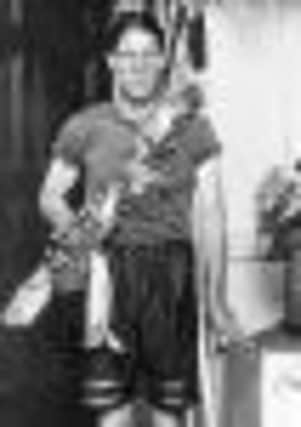Did chip eating, heavy-smoking Olympic hero ‘take the pee’ to win gold?


The much-publicised 100-year anniversary of Kennedy Kane (KK) McArthur’s victory coincides with the 2012 London Games and it was announced last month the famous Olympic Torch will pass through his home village of Dervock just outside Ballymoney next June to mark his feat.
Heavy-smoking KK McArthur - who also was known for his fondness of chips - triumphed in the marathon at the 1912 Games in Stockholm.
Advertisement
Hide AdAdvertisement
Hide AdAlthough McArthur emigrated to South Africa prior to the Stockholm Games, and was running for his adopted country, he returned to Ulster and lived in north Antrim for several years after his success.
Born in Dervock on February 10 1881, McArthur was the second of five children. After attending the National School, ‘Big Ken’ became a postman, famed for sprinting on his round, and for racing against the trains on the narrow gauge line to Ballymoney.
Around 1900 he emigrated to South Africa as a volunteer member of the Baden-Powell South African Constabulary, and after the Anglo-Boer War he joined the South African Police. He seldom went on patrol on horseback, preferring to walk the huge area of his patch. He left the SAP as sergeant in 1931.
With Christopher Gitsham, McArthur was one of two entrants for South Africa in the marathon at the Stockholm Olympic Games in 1912. The reported temperature on the day of the race, Sunday July 14, was 32 degrees in the shade.
Advertisement
Hide AdAdvertisement
Hide AdIndeed one competitor, Lazaro of Portugal, collapsed and died in hospital the following day.
Details have emerged of an alleged pact between McArthur and Gitsham prior to the race starting that they would run alongside each other.
Two kilometres before the end of the race Mother Nature called on Gitsham, it is alleged.
Quite relaxed he entered the bushes expecting his team mate to wait for him.
Advertisement
Hide AdAdvertisement
Hide AdIt’s alleged when he was back on the road he could only see McArthur disappearing over the last hill before the entrance to the stadium.
Rumour has it McArthur was spurred on by a voice in the crowd shouting: “Come on Antrim - come on ye boy ye!”
This story was never confirmed by either of the athletes involved.
On winning the gold medal, McArthur said: “I went out to win or die, and it was worth two-and-a-half years working and waiting for. “ McArthur’s time was 2:36:54.8, with Gitsham finishing less than a minute after his teammate.
Advertisement
Hide AdAdvertisement
Hide AdAfter Stockholm, McArthur visited Ballymoney for a hero’s welcome. Back in South Africa, an unfortunate injury to his foot ended his running career about a year after his triumph. On retiring from the police, McArthur came back to Dervock with his wife, Johanna Louw, and from 1931- 36 they settled on the family farm.
They then returned to South Africa, where McArthur died in Potchefstroom on June 13 1960.
Gitsham passed away four years earlier, in June 1956.
Because McArthur only wrote his name as K.K.McArthur on his entry form for the marathon, sports reporters who knew he was called Ken assumed his name must be Kenneth.
A Kenneth McArthur sports stadium at Potchefstroom was even named after him. It was only when his grave, and subsequently his death certificate, were discovered that the truth surfaced.
Advertisement
Hide AdAdvertisement
Hide AdMcArthur’s exploits have secured him hero’s status in Dervock.
A blue plaque commemorates the house he was brought up in and each year a half marathon takes place locally in his honour.
A total of 65 communities — in all 26 council areas in Northern Ireland — are set to help the flame on its way to the Olympic Stadium in time for the July 27 opening ceremony.
Between June 3 and June 7, local bearers will carry the highly symbolic torch along roads, rivers and even across Lough Neagh as it moves around the province.